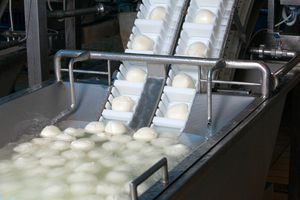The variety of cheeses produced in Italy must achieve particular characteristics. This requires tailored hygiene and animal welfare processes right from the farm.
The global cheese market brings specific requirements to the milk production stage of the food chain. Fat and protein content and the quality of microbial flora are the most important elements in the milk composition, which directly impact the cheese-making process. Italy's vast array of cheese requires tailored hygiene processes, which begins on the farm.
Agri-Sector Manager, Sonia Tombolato, works with dairy farmers of varying size, providing the highest level of hygiene solutions and animal welfare, with the aim to produce good quality milk that becomes high-quality cheese. This includes solutions to treat udders and hooves and chemical formulations to disinfect and maintain the condition of milking machines, milk tanks, clusters and surfaces.
In Italy, some, but not all, processors are obliged to use milk from specific suppliers, though most relationships between dairy farmers have remained in place for years. It is important that good relationships are maintained - and these are centered around good quality milk. The CIP (cleaning in place) process is always the main priority, as this has to be a high standard for producing all cheeses.
For cheese vats, single-stage cleaning is performed, which requires a special chemical blend with low surfactant level in order to prevent the cheese from sticking to the wall.
For cheese molds, otherwise known as forms, the same single-stage clean is completed to the recommendations of the supplier of the mold, as the use of some surfactants can create stress corrosion of the cheese mold.
Mold-cured or mold-ripened cheese is a cured cheese in which the curing has been accomplished primarily by the development of characteristic mold growth throughout the interior and/or on the surface of the cheese. The hygiene routine for these types of cheese must ensure the surfaces are free from spoilages that will influence and decay the growth of the mold colonies. A deep clean, with focus on fat removal, followed by a disinfectant, will eliminate these spoilages.
Bacteriophage can be a major problem - if the phages get control over the starter cultures, the curd will not achieve the right pH and curd formation is prevented. In several cases, this may call for a new starter culture at every batch.
Mozzarella
Mozzarella is a traditional southern Italian cheese, with a unique elasticity, as well as a characteristic taste and fragrance.

Mozzarella cheese producers aim to achieve a 28-day shelf life, so the processing equipment has to be clean enough to maintain these parameters; CIP processes are the most important stage for producing this type of cheese, ensuring that the equipment is free from bacteria.
Gorgonzola
Gorgonzola is one of the world's oldest blue-veined cheeses., with a crumbly, soft texture and a nutty aroma. The Cheese is mainly produced in the northern Italian regions of Piedmont and Lombardy, in Gorgonzola.
The signature characteristic of Gorgonzola is the type of mold that produces the flavor, which is achieved over a 2-3 month ripening period. Processors must follow a detailed cleaning in place (CIP) application that protects this mold and perfects the flavor, which means a special chemical formulation that doesn't kill this type of mold during the ripening stage must be used.
Crescenza
Crescenza is a fresh soft cheese with a creamy, spreadable texture, a mild and delicate texture and no rind. It is traditionally produced in the Lombardy, Piedmont and Veneto regions of Italy and is said to be the ultimate cheese in expressing the natural flavor and aromatics of good quality milk.
For the production of this cheese, the molds in which the cheese is made require a thorough cleaning. It is important to check the water hardness and manage the acid/alkaline balance at this stage to ensure the natural flavors are achieved.
Parmigiano Reggiano and Pecorino
Parmesan cheese has a hard, gritty texture and is fruity and nutty in taste, while Pecorinos are traditional, hard, drum-shaped cheeses.

Hygiene processes for producing harder cheeses such as parmesan and pecorino are easier to manage as they have a longer storage period than others, often 6-24 months, which varies depending on the producer. The production stages must provide a good standard of CIP, ensuring the equipment is free from bacteria so it doesn't multiply over the aging period.
Gianmarco Giugno has been the Diversey Dairy Sector Manager for 25 years, working alongside Account Manager Andrea Fumagalli for 14 years to provide hygiene solutions to dairy processors, including cheese producers.
We are proud to work with Italy's dairy processors and cheese producers. We believe that we are more flexible than our competitors, providing years of experience and knowledge to help our customers produce first-class Italian cheese.
For small and medium-sized processors, this means advice on specific products and solutions, and for larger customers, they are also involved in the wider strategy such as savings on costs, water and energy use, looking closer at KPIs.?
During their careers, Gianmarco and Andrea have noticed a trend in customer focus when it comes to hygiene solutions. 14 years ago, the attention was on saving on water and energy costs as processors changed and modernized their production processes, though there remains a focus on tradition and quality.
In the last 4-5 years, production has become faster as people continue to invest in modern equipment, which they believe will continue to follow on in the rest of the industry. There is also more focus on hygiene and traceability, and the demand for high-quality authentic products has not faltered.
Sonia Tombolato adds, "What I like most about my job is meeting customers and discussing the opportunities to improve their results together. My customers speak highly of Deosan products and have never had any issues with their hygiene levels, milk tanks and milking machines since they started using them.
Find out more about our solutions for both farm and processing environments.